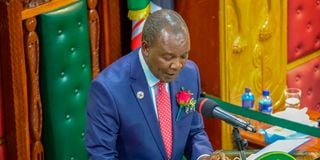
Former National Treasury and Economic Planning Cabinet Secretary Prof Njuguna Ndung’u reads the budget in Parliament on June 13.
Cutting waste is not austerity. Media, traditional and social, should not fall for Kenya Kwanza’s cynical trap by referring as austerity measures, the half-hearted proposals to reduce the budget. They are not. They are anger driven and in bad faith. Let us examine the expenditures in some detail.
The proposed cuts have focused on the development vote. This has given rise to the view that the Executive, humiliated by the overwhelming rejection of additional taxation, is intent on “punishing” Kenyans. In the approved budget, the development vote is Sh458.9 billion. The supplementary proposes to reduce it by Sh122.4 billion, equivalent to one third. Comparatively, the approved recurrent expenditure is many times more, at Sh1.35 trillion. From this, only Sh34 billion, a mere 2.7 per cent is being reduced.
What is in recurrent expenditure that should be a sacred cow? Wages and salaries are straightforward and easy to understand. Payroll makes up about half of recurrent expenditures.
The other recurrent budget lines are stated in fairly nebulous terms. For instance, the Executive Office of the President has four broad programs. These are Government Printing Services, General Administration Planning and Support Services, Government Advisory Services, and Leadership and Coordination of Government Services.
Sh3.58 billion
Excluding wages and salaries, the reduced budget for the four programs is now Sh3.58 billion shillings, 646.8 million having been knocked off. But what is the actual content of these programs?
Staying with the same lens, the four programs involve the following vote heads: Headquarters Administrative Services (by far the largest budget), State Corporations Advisory Committee, the Kenya/Southern Sudan Liaison Office, Inspectorate of State Corporations, National Economic and Social Council, National Cohesion, Directorate of Remote Sensing and Surveys, Betting Control and Licensing Board, Office of the Government Printer, Strategic Policy Advisory Services, and finally, Leadership and Coordination.
The Kenya/Southern Sudan Liaison Office deserves special mention. It is a legacy of the South Sudan liberation war. During the war, Kenya could not have normal diplomatic relations with South Sudan, so a liaison office was set up. But once South Sudan was independent and full diplomatic relations set up, this office should have ceased to exist. What is the justification of having this office today?
Looking at the vote heads and the titles, you still cannot tell what the money buys. So, let us peel the onion further.
In all government departments, recurrent expenses fall into 10 categories. These include domestic travel, subsistence, and other transportation cost; and foreign travel, subsistence, and other transportation costs. The purposes are self-explanatory. Every unit, section or function has training expenses, hospitality supplies and services, other operating expenses, routine maintenance of other assets, and almost always, purchase of office furniture and general equipment. It is unclear why we should buy furniture every year.
Examining hospitality supplies and services, you could be forgiven for thinking that government is in the hospitality business. A very large function of government, it would appear, is to entertain.
At Harambee House, the Executive Office of the President, which includes the Chief of Staff and Head of Civil Service, will spend Sh33.4 million on hospitality, a 50 per cent reduction. The Power of Mercy Secretariat will spend Sh18.1 million on hospitality.
Strategic Policy Advisors
The Strategic Policy Advisors will spend Sh2.25 million on tea, chapatis and sweet potatoes. The International Boundary Office will spend a much higher amount at Sh35.75m. With exception of the quarrel between us and Somalia about the imaginary line that defines the exclusive economic zone in the Indian ocean, one does wonder which other boundary disputes require such copious amounts of tea and coffee to resolve.
Then there are the folks looking after Strategic Initiatives and Development of Arid/Semi-Arid Regions. They require Sh10.59 million for tea and kebabs as they ponder what is to be done with the dry parts of Kenya. Never mind devolution, and the duplication of the regional development authorities. On their part, and as they check whether parastatals are working, and which politicians should be recycled as directors, the State Corporations Oversight Office requires Sh2.43 million worth of tea.
Mwaura’s Office of the Government Spokesperson needs Sh4.1m for the same purposes. Frankly, you might excuse that. Keeping a straight face while telling tales is tough work, requiring water, tea and coffee frequently. The Finance Unit which pays for it all requires Sh4.93 million shillings worth of the stuff for themselves!
The obsolete Kenya/Southern Sudan Liaison Office requires Sh6.24m of tea and mandazi in case Salva Kiir comes visiting, while the Inspectorate of State Corporations will spend 4.97m. It is unclear why we should need both the Inspectorate and the State Corporations Oversight Office, as well as the very elaborate State Corporations Advisory Committee. How many men and women does it take to change a light bulb?
These important expenditures cannot be reduced! In the meantime, to put the Gen Z in their place, the Executive has decided that the budget for the National Fund for the Disabled of Kenya be reduced by Sh329 million shillings. The Machakos Technical Institute for the Blind will not get Sh15 million, the St Joseph’s Technical Institute for the Deaf will not be getting Sh10 million. The Sh5 million for the Tinderet Special Needs Integrated Institute, as well as the Sh50 million for Eldoret Polytechnic will not be forthcoming.
Angry. Cynical. Half-hearted. Uncaring. But not austerity.
@NdirituMuriithi is an economist













